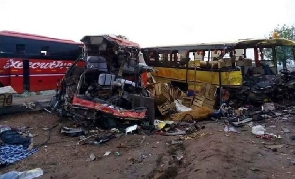The District Chief Executive (DCE) for North Gonja has said people in the district, including graduates, no longer have an excuse not to go into farming following the implementation of the Planting for Food and Jobs Programme.
Mr Adam Eliasu Bawah said the intervention of government in providing farm inputs at highly subsidized prices will help ease the difficulties farmers previously went through in cultivating crops.
Red Bawah, as he is popularly known, made the observation during an event to distribute subsidized farm inputs to farmers in the area as part of the Planting for Food and Jobs Programme.
“…Our problem used to be capital and the inputs that government has brought, talking about the fertilizer and the seeds, I’m sure will solve about 80 per cent of the problems of farmers so I don’t see the reason why anybody cannot go into farming as we speak now,” he said.
Red Bawah says the district has so far taken delivery of 10,120 bags of NPK and Sulphate of Ammonia fertilizers, 1200 bags of maize seeds and several bags of rice seeds for onward distribution to the farmers. He added that they were expecting more inputs to arrive in the coming days.
According to him, more than 2000 farmers have so far been registered to participate in the programme.
The Planting for Food and Jobs Programme was launched by the president Nana Akufo-Addo in April this year with the ultimate aim of transforming the agriculture sector in the country. The president said, during the launch, that the successful implementation of the programme will, among other things, prevent the youth from migrating to other parts of the country in search of non-existing jobs.
“The Planting for Food and Jobs Programme is expected to increase the production of maize by 30 per cent, rice by 49 per cent; soybean by 25 per cent and sorghum by 28 per cent from current production levels. This programme will create 750, 000 jobs in both direct and indirect employment,” the president indicated.
To this end, the DCE for North Gonja said farmers were required to pay half of the subsidized prices before taking delivery of the inputs and pay the rest in the form of produce after harvesting.
He said: “as we speak, they are only coming to pay half of the subsidized price. The NPK is GHC57 per bag, you pay half of that and take a bag. Depending on the number of acres, we will give two bags of NPK per acre and one bag of Sulphate of Ammonia per acre and so the number of acres you plough will determine the quantity of fertilizers you will get. After harvesting, we will quantify the remaining half of the amount and then you pay that in crops.”
The farmers who benefited from the programme could not hide their joy. They thanked the DCE and the government for coming to their aid.
Fuseini Zakaria, a national service person who took advantage of the policy to go into farming was full of praise for the government.
“I’ve been given 15 bags of fertilizer to apply on my maize farm. I’ve paid half of the price and will pay the rest in the form of crops after harvesting. I’m very excited and I will like to thank the DCE and the government. The step the government has taken will help farmers a lot,” Zakaria said.
The farmers however complained of difficulty in accessing tractor services in the area and appealed to government to assist them in that regard.
Another farmer, Musah Danbol said: “I’m so grateful and thankful to God. I have received 36 bags of fertilizer and maize seeds. I thank the government for the intervention. The problem we have now is difficulty in accessing tractor services and we appeal to government to step in and help us.”
The Chief Executive assured that interim measures were being put in place to help the farmers as government prepares to find a lasting solution to the problem.
“It’s a challenge and we are working hard to assist the farmers to get their farm lands ploughed. We are going to engage the tractor owners so that those of the farmers who are not able to pay now, the assembly will guarantee for them to plough so that later on we will ensure that they pay for the services while government works around the clock to get tractors for all the districts. By next year all these will be a thing of the past,” he pointed out.
Red Bawah assured that adequate measures had been put in place to ensure that the farmers do not divert the inputs. This, he said, would help them get maximum yield so that government can recover the full cost of the subsidized inputs.
“We have a District Technical Committee. We have [also] set up volunteer groups across the district. The groups are meant to check the activities of the farmers, the groups will also check the activities of people who may try to smuggle the fertilizer,” he stated.
He reiterated government’s plan to provide market for the surplus that will be produced by the farmers. He said Senior High Schools in the area would be required to buy their foodstuffs from the farmers.
He advised the farmers to put the inputs to good use in order to maximize and yield and benefit from their labour.
Meanwhile, farmers in some parts of the country are protesting against the foreign seeds being supplied them, arguing that those seeds do not withstand local conditions.
Regional News of Thursday, 22 June 2017
Source: radiotamale.com













